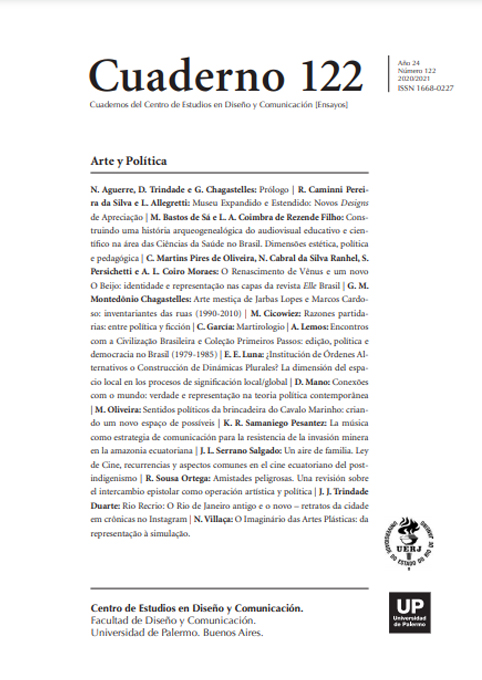¿Institución de Órdenes Alternativos o Construcción de Dinámicas Plurales? La dimensión del espacio local en los procesos de significación local/global
Abstract
Interesting in highlighting the historical characterization of art as a disruptive political element. And it is, observing that this process has only been possible from a conscious and critical articulation of the local spaces and their characterizations, that the present work, is situated in the search of alternative productions to the established orders. Seeing its legitimacy in the representation of the joints denied by the local space. This objective is worked, through the analysis of the productions of sense of the Civil Environmental Organizations of the Province of San Juan, understanding said actor as representative of these articulations. Being able to identify in their visibility regimes, a reproductive stage that raises in the very existence of these organizations and in their processes of reproduction of senses an economic, aesthetic and local alternative political proposal, that is, a conceptual proposal that considers a plural order , as a representation of the need to establish new types of space that make visible the intrinsic articulation between the public and the private given in the integral process of production of local meaning. As an emergent order, based on an ecosystemic perspective of the articulated local, in an interlocal form, within the logics of the global organism.
References
Castoriadis, C. (2006). Figuras de lo Pensable México: Editorial del Fondo de la Cultura Económica.
Cigolani, G. y Fernández, M. (2010). Oficios terrestres. Televisión y política: espacio público, puestas en escena y regímenes de visibilidad, 16 (25), 37-49.
Coraggio, J. L. (2011). Economía social y solidaria. El trabajo antes que el capital Quito: Ediciones Abya Yala.
Dirlik, A. (2000). Place-based Imagination: Globalism and the Politics of Place. Nueva
York. Citado en: Escobar, A. (2000). El lugar de la naturaleza y la naturaleza del lugar: ¿Globalización o Posdesarrollo? En: La colonialidad del saber: eurocentrismo y ciencias sociales. Perspectivas Latinoamericanas (pp. 246-287) Buenos Aires: CLACSO, Consejo Latinoamericano de Ciencias Sociales.
Escobar, A. (2000). El lugar de la naturaleza y la naturaleza del lugar: ¿Globalización o Posdesarrollo? En: La colonialidad del saber: eurocentrismo y ciencias sociales. Perspectivas Latinoamericanas (pp. 246-287) Buenos Aires: CLACSO, Consejo Latinoamericano de Ciencias Sociales.
Espoz, M. (Ed.) (2017). Sentires (in)visibles. La construcción de entornos en espacios socio segregados Buenos Aires: Teseo Press.
Gudynas, E. (2004). Ecología, economía y ética del desarrollo sostenible Montevideo: Coscoroba Ediciones.
Leff, E. (2005). OSAL. La geopolítica de la biodiversidad y el desarrollo sustentable. Economización del mundo, racionalidad ambiental y reapropiación social de la naturaleza, 6 (17), 263-273.
Racioppe, B. (2014). Cultura libre y copyleft: hacia una redefinición en la manera de entender la producción artística La Plata: UNLP. Disponible en: http://sedici.unlp.edu.ar/handle/10915/44651
Verón, E. (1993). La semiosis social. Fragmentos de una teoría de la discursividad. Barcelona: Editorial Gedisa.
Los autores/as que publiquen en esta revista ceden los derechos de autor y de publicación a "Cuadernos del Centro de Estudios de Diseño y Comunicación", Aceptando el registro de su trabajo bajo una licencia de atribución de Creative Commons, que permite a terceros utilizar lo publicado siempre que de el crédito pertinente a los autores y a esta revista.


